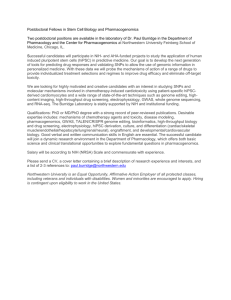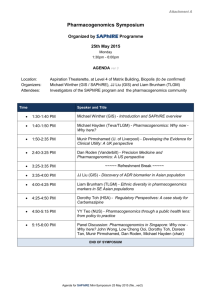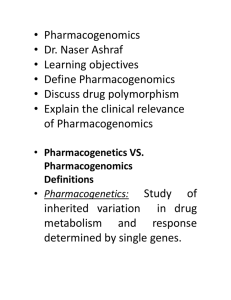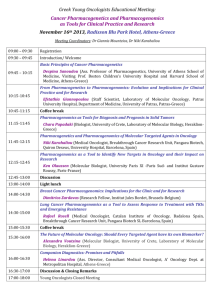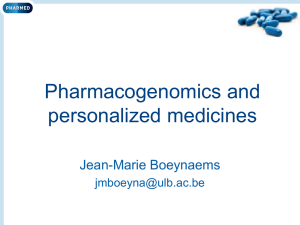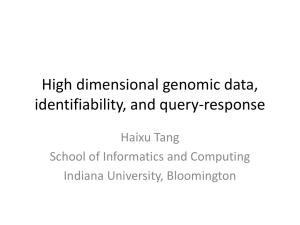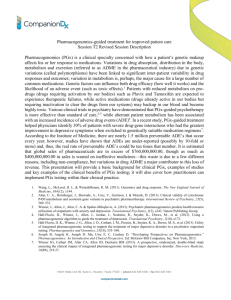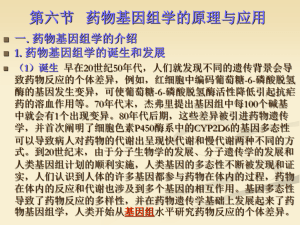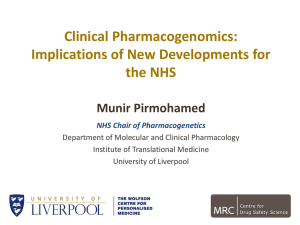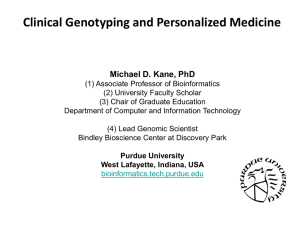- Open Research Online
advertisement
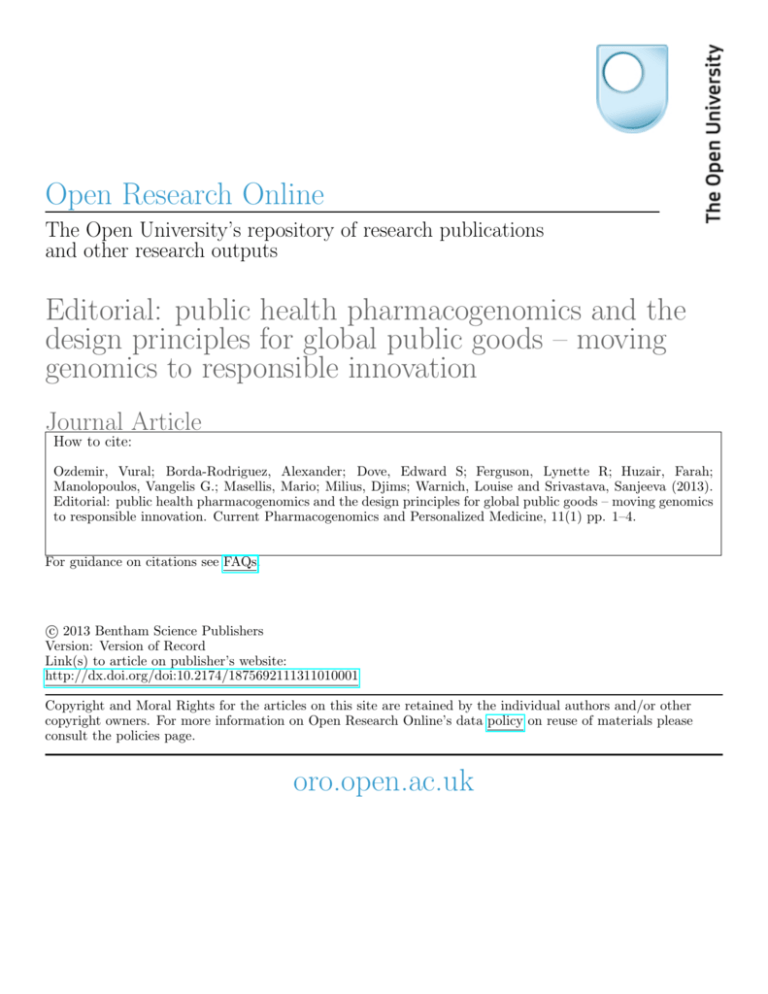
Open Research Online The Open University’s repository of research publications and other research outputs Editorial: public health pharmacogenomics and the design principles for global public goods – moving genomics to responsible innovation Journal Article How to cite: Ozdemir, Vural; Borda-Rodriguez, Alexander; Dove, Edward S; Ferguson, Lynette R; Huzair, Farah; Manolopoulos, Vangelis G.; Masellis, Mario; Milius, Djims; Warnich, Louise and Srivastava, Sanjeeva (2013). Editorial: public health pharmacogenomics and the design principles for global public goods – moving genomics to responsible innovation. Current Pharmacogenomics and Personalized Medicine, 11(1) pp. 1–4. For guidance on citations see FAQs. c 2013 Bentham Science Publishers Version: Version of Record Link(s) to article on publisher’s website: http://dx.doi.org/doi:10.2174/1875692111311010001 Copyright and Moral Rights for the articles on this site are retained by the individual authors and/or other copyright owners. For more information on Open Research Online’s data policy on reuse of materials please consult the policies page. oro.open.ac.uk Send Orders of Reprints at reprints@benthamscience.net Current Pharmacogenomics and Personalized Medicine, 2013, 11, 1-4 1 Editorial Article Public Health Pharmacogenomics and the Design Principles for Global Public Goods – Moving Genomics to Responsible Innovation Vural Özdemir1,2,3,*, Alexander Borda-Rodriguez4,5, Edward S. Dove2,6, Lynnette R. Ferguson7,8,9, Farah Huzair4,5, Vangelis G. Manolopoulos10,11,12, Mario Masellis13, Djims Milius2,14, Louise Warnich15 and Sanjeeva Srivastava16,* 1 Research Group on Complex Collaboration, Faculty of Management, McGill University; 2Centre of Genomics and Policy, Department of Human Genetics, Faculty of Medicine, McGill University, Montreal, QC, Canada; 3DataEnabled Life Sciences Alliance International (DELSA Global), Seattle, WA, USA; 4Development Policy and Practice, The Open University, Walton Hall, Milton Keynes, UK; 5The ESRC Centre for Social and Economic Research on Innovation in Genomics (Innogen Centre), Milton Keynes, UK; 6Columbia Law School – LL.M. Program, New York, NY, USA; 7Auckland Cancer Society Research Centre, Faculty of Medical and Health Sciences (FM&HS), The University of Auckland, Auckland, New Zealand; 8Discipline of Nutrition, FM&HS, The University of Auckland, Auckland, New Zealand; 9Nutrigenomics New Zealand, New Zealand; 10Laboratory of Pharmacology, Medical School, Democritus University of Thrace, Alexandroupolis, Greece; 11Clinical Pharmacology Unit, Academic General Hospital of Alexandroupolis, Alexandroupolis, Greece; 12European Society of Pharmacogenomics and Theranostics; 13L.C. Campbell Cognitive Neurology Research Unit, Sunnybrook Research Institute, Department of Medicine (Neurology), Sunnybrook Health Sciences Centre, University of Toronto, Toronto, ON, Canada; 14Faculty of Private Law, University of Cape Town, Cape Town, South Africa; 15Department of Genetics, Stellenbosch University, Stellenbosch, South Africa; 16 Wadhwani Research Center for Biosciences and Bioengineering, Department of Biosciences and Bioengineering, Indian Institute of Technology Bombay, Powai, Mumbai, India Keywords: Genomics and development, genomics without borders, global governance of biotechnology innovation and uncertainty, P5 medicine, public health pharmacogenomics, responsible innovation, STS and organizations, theranostic medicine. “Evidence in the clinical care context differs from evidence in the public health and health policy domains. It is often difficult to apply rigid hierarchies of evidence to public health policy.” Tikki Pang [1] “Pharmacogenomics and personalized medicine knowledge cannot be siloed into a pure and narrow technology lens alone. The field’s ontology requires a nuanced understanding of the complex linkages between the science, technology, society, and politics ecosystem and therefore must be situated within a broader framework.” Edward S. Dove [2] “The trend has been to use data derived from African populations to build research programmes and enhance individual careers in more affluent communities with little or no consideration for the populations from which this material was derived.” Jantina de Vries and Michael Pepper [3] 1. A POPULATION FOCUS FOR GENOMICS, PERSONALIZED MEDICINE AND GLOBAL SOCIETY Current Pharmacogenomics and Personalized Medicine (CPPM) was launched in 2008 to respond to knowledge, Address correspondence to Dr. V. Özdemir, Associate Professor and Senior Scholar, Faculties of Medicine and Management, McGill University, 1001 Sherbrooke Street West, Montreal, QC, Canada H3A 1G5; Tel: +1 514 3986920, Email: vural.ozdemir@mcgill.ca, vural.ozdemir@alumni.utoronto.ca; or Dr. S. Srivastava at Department of Biosciences and Bioengineering, Indian Institute of Technology Bombay, Powai, Mumbai-400076, India; Tel: +(9122) 2576-7779; Fax: +(91-22) 2572-3480; Email: sanjeeva@iitb.ac.in *All authors are listed alphabetically except the corresponding authors. 1875-6913/13 $58.00+.00 policy and biotechnology governance gaps at the unique intersection of personalized medicine, genomics, public health and social studies of knowledge-based innovation. Distinct from traditional discovery science characterized by a “first hypothesize-then-experiment” method of scientific inquiry, this nascent field of public health pharmacogenomics is richly informed by CPPM scholarship that recognizes the new dual reconfiguration of 21st-century data-intensive omics science, blending infrastructure science and discovery science. Importantly, CPPM addresses novel diagnostics and responsible personalized medicine applications both in developing and developed countries. This is crucial for global capacity building, as developing countries may © 2013 Bentham Science Publishers 2 Current Pharmacogenomics and Personalized Medicine, 2013, Vol. 11, No. 1 lack the resources, expertise and sound regulation for pharmacogenomics; this may result in premature buy-in for novel biotechnologies without adequate alignment with local public health priorities and societal values [3, 4]. The journal aims to strike the right balance to catalyze the transition of pharmacogenomics and personalized medicine discoveries to practice, while preventing the premature translation of candidate applications [5-7]. Finally, the journal integrates molecular and clinical investigation with public policy and social studies of biotechnology, which collectively shape the postgenomics personalized medicine innovation trajectory. 2. LOOKING BEYOND THE LABORATORY SPACE: RESPONSIBLE INNOVATION “Responsible innovation” is an emerging concept that CPPM scholars investigate, and is closely linked to public health pharmacogenomics. For innovation to be responsible, the scientific design space must involve more than traditional experts. It must involve a broad array of experienced, engaged and enthusiastic members of the public, such as citizen scholars, patients, policymakers and other knowledge end-users [5-10]. This “opening up” of the hitherto cloistered scientific design space produces scientific knowledge that is closely embedded with societal values, the public interest and end-user priorities and thus, becomes socially robust and sustainable. Just as public health pharmacogenomic needs input from a broader, large range of publics, so too does it require access to large information databases and adequate knowledge translation platforms that facilitate knowledge synthesis and dissemination across experts and publics. The powerful scope of this field will be fully realized once genomic population-based studies can be effectively linked to population-based health administrative databases, electronic health records, and nutrition and lifestyle data. This has significant societal, legal and ethical implications, in terms of confidentiality and privacy of individuals contributing genomic data, not to mention the new ways of understanding these constructs in the age of post-genomics personalized medicine [11]. This will require profound deliberation and input from those involved in policy development. As it has done for the last five years, CPPM will continue to lead the way in co-creating and disseminating policy relevant scientific advances to sustain public trust in pharmacogenomics and public health. Public health pharmacogenomics also offers the promise to prevent research waste, which remains a serious problem in the health domain. For example, a scoping analysis of 344 studies in health and allied sciences addressing patients’, clinicians’ and researchers’ priorities for research, found that only nine considered the extent to which questions posed by researchers matched questions of relevance to patients and clinicians [12]. Furthermore, translation of pharmacogenomics into the clinic remains a challenge, especially in low and middle income countries that can benefit much from effective and safe therapeutic regimes [13]. CPPM’s focus on public health pharmacogenomics is aligned with integrated, responsible innovation, knowledge Özdemir et al. co-production and benefit-sharing by scientists, technology designers, communities and other producers or consumers of knowledge. As noted earlier by Dove in this journal [2], this in part reflects the journal’s commitment to horizontalization of knowledge co-production: it is not a question of the contributors’ age, gender, geographical location, perceived prestige of authors’ institutional affiliation, maiden language, individual social capital or economic power, but rather one of original, reasoned ideas and scholarship. We posit that a good amount of research waste can be eliminated if researchers and patients, participants and publics communicated with, rather than past, one another and consider viewpoints from all peoples and places, especially given the often serendipitous nature of scientific and technological discovery and development. Ultimately, such nonassuming horizontal approach to knowledge co-production helps create an open commons that is self-corrective and self-calibrating against biases, entrenched politics and disciplinary or epistemic “knowledge tribes” created by human kinds, and embedded in human positivist inquiry, be it in natural sciences, social sciences or humanities [4, 9]. 3. DESIGN PRINCIPLES FOR GLOBAL PUBLIC GOODS We have started the current socio-technical analysis of the post-genomics personalized medicine landscape with quotes from scholars in global public health and social studies of biotechnology and innovation, including Tikki Pang, the lead writer of the World Health Report 2012. Pang has recently suggested to us that the future developers and users of diagnostics for health interventions (theranostics) to be cognizant of the “design principles” for global public goods (GPGs), of which public health pharmacogenomics is a good example. These principles were outlined by Elinor Ostrom, Nobel Laureate in Economic Sciences in 2009 (Table 1, with modifications by Pang) [14, 15]. CPPM readers are encouraged to read the seminal works on the governance of the commons and institutional diversity by Ostrom [15, 16], and the ways in which these can impact behavior in society, including our 21st century knowledge society [8] that is being shaped by globalization of genomics and personalized medicine [5, 11, 13]. 4. WHAT IS NEXT FOR PUBLIC HEALTH PHARMACOGENOMICS? We are situating this first issue of the new year, and reaffirming the commitment of CPPM, to address the needs of the personalized medicine knowledge society [8, 17-22]. We are also commencing the new year with an expanded, globally inclusive, distributed and transdisciplinary international editorial board. CPPM senior editorial leadership will transition and evolve in the coming months to further accelerate this progressive vision that has brought to light cutting edge research, and transformative ideas in pharmacogenomics and personalized medicine over the past five years by leading scholars from all parts of the globe (see, for example, [13, 21-24]). In this inclusive spirit, we welcome your enthusiastic contributions of manuscripts for peer review in 2013 and beyond. Editorial Table 1. Current Pharmacogenomics and Personalized Medicine, 2013, Vol. 11, No. 1 3 Design principles for global public goods and the nascent field of public health pharmacogenomics. • Clearly defined beneficiary of success; • Convergence between success and environmental conditions is necessary; • Contributions necessary to develop and use common resources should be monitored by individuals who developed and use the GPGs; • Dialogue and discourse mechanisms should be available; • Governance systems are organized in nested enterprises and each organization must conform to larger systems; • Individuals affected by GPGs should have a voice in modifying the developmental pathways; and • Individuals producing GPGs should have the ability to devise their own ways of achieving ends. CONFLICT OF INTEREST The author(s) confirm that this article content has no conflict of interest. [7] [8] ACKNOWLEDGEMENTS The analysis, concepts and work reported herein were informed and supported by the following research grants to the authors: V. Özdemir (Canadian Institutes of Health Research operating research grant, #84620, on pharmacogenomics policy, and a research grant from the Social Sciences and Humanities Research Council, 231644, on emerging biotechnology foresight research); L. Warnich (National Research Foundation and Medical Research Council of South Africa) and S. Srivastava (Council of Scientific and Industrial Research (CSIR), Government of India grant No. 37 (1474)/11/EMR-II, IIT Bombay start up grant 09IRCC007, SERC Fast Track Young Scientist Award). This article is peer reviewed. The views expressed in this article are the personal opinions of the authors and do not necessarily represent the positions of their affiliated institutions or the funding agencies. [9] [10] [11] [12] [13] ABBREVIATIONS CPPM = Current Pharmacogenomics and Personalized Medicine REFERENCES [1] [2] [3] [4] [5] [6] Pang T. Evidence to action in the developing world: what evidence is needed? Bull World Health Organization 2007; 85: 247. Dove ES. To leave no stone unturned: the launch of a perspectives section for the journal. Curr Pharmacogenomics Person Med 2012; 10(2): 99-100. Available from: http://www.benthamdirect.org/ pages/content.php?CPPM/2012/00000010/00000002/001AF.SGM [Accessed January 14, 2013]. de Vries J, Pepper M. Genomic sovereignty and the African promise: mining the African genome for the benefit of Africa. J Med Ethics 2012; 38(8): 474-8. Pang T. Global health and research: changing the agenda. In: Benatar SR and Brock G. (Editors). Global Health and Global Health Ethics. Cambridge: Cambridge University Press, 2011; pp. 285-292. Reddy PJ, Jain R, Paik YK, et al. Personalized medicine in the age of pharmacoproteomics: A close up on India and need for social science engagement for responsible innovation in post-proteomic biology. Curr Pharmacogenomics Person Med 2011; 9(1): 67-75. Dove ES, Faraj SA, Kolker E, et al. Designing a post-genomics knowledge ecosystem to translate pharmacogenomics to public health action. Genome Med 2012; 4: 11. Available from: http://genomemedicine.com/content/pdf/gm392.pdf [Accessed January 14, 2013]. [14] [15] [16] [17] [18] [19] [20] [21] [22] Özdemir V, Fisher E, Dove ES, et al. End of the beginning and public health pharmacogenomics: Knowledge in ‘Mode 2’ and P5 Medicine. Curr Pharmacogenomics Person Med 2012; 10(1): 1-6. European Commission. EUR 22700 – Science & Governance — Taking European knowledge society seriously. Luxembourg: Office for Official Publications of the European Communities, 2007. Wynne B. Daring to imagine. India Seminars 2009. Available from: http://www.india-seminar.com/2009/597/597_brian_wynne. htm [Accessed January 14, 2013]. Wynne B. Lab work goes social, and vice versa: Strategising public engagement processes: Commentary on: “What happens in the lab does not stay in the lab: Applying midstream modulation to enhance critical reflection in the laboratory”. Sci Eng Ethics 2011; 17: 791-800. Özdemir V, Joly Y, Kirby E, et al. Beyond ELSIs - Where to from here? From 'regulator' to anticipating and shaping the innovation trajectory in personalized medicine. In: Pharmacogenomics: Challenges and Opportunities in Therapeutic Implementation. Lam, YWF and Cavallari L. (Editors). Amsterdam: Elsevier (in press). Oliver S, Gray J. A Bibliography of Research Reports about Patients’, Clinicians’ and Researchers’ Priorities for New Research. London: James Lind Alliance, 2006. Warnich L, Drögemöller BI, Pepper MS, et al. Pharmacogenomic research in South Africa: Lessons learned and future opportunities in the rainbow nation. Curr Pharmacogenomics Person Med 2011; 9(3): 191-207. Available from: http://www. benthamdirect.org/pages/content.php?CPPM/2011/00000009/0000 0003/007AF.SGM [Accessed January 14, 2013]. Pang T. Theranostics, the 21st century bioeconomy and 'one health'. Expert Rev Mol Diagn 2012; 12(8): 807-9. Available from: http://www.expert-reviews.com/doi/pdf/10.1586/erm.12.123 [Accessed January 14, 2013]. Ostrom E. Governing the Commons: The Evolution of Institutions for Collective Action. Cambridge: Cambridge University Press, 1990. Ostrom E. Understanding Institutional Diversity. Princeton: Princeton University Press 2005. Dove ES, Özdemir V. “Regular science” is inherently political. EMBO Rep 2013; 14(2): 113. Bauman Z. Liquid Modernity. Cambridge: Polity Press 2000. Bourdieu P, Wacquant L. An invitation to reflexive sociology. Chicago: University of Chicago Press 1992. Kickbusch I. Health governance: the health society. In: Health and Modernity: The Role of Theory in Health Promotion. McQueen DV, Kickbusch I, Potvin L, et al., Eds. New York: Springer 2007; pp. 144-61. Dandara C, Adebamowo C, de Vries J, et al. An idea whose time has come? An African foresight observatory on genomics medicine and data-intensive global science. Curr Pharmacogenomics Person Med 2012; 10(1): 7-15. Ozdemir V, Rosenblatt DS, Warnich L, et al. Towards an ecology of collective innovation: Human Variome Project (HVP), Rare Disease Consortium for Autosomal Loci (RaDiCAL) and DataEnabled Life Sciences Alliance (DELSA). Curr Pharmacogenomics Person Med 2011; 9(4): 243-51. Available from: http://www. benthamdirect.org/pages/content.php? 4 Current Pharmacogenomics and Personalized Medicine, 2013, Vol. 11, No. 1 [23] CPPM/2011/00000009/00000004/002AF.SGM [Accessed January 14, 2013]. Sardas S. Pharmacogenovigilance – An idea whose time has come. Curr Pharmacogenomics Person Med 2010; 8(1): 1-3. Available from: http://www.benthamdirect.org/pages/content.php?CPPM/2010/ 00000008/00000001/001AF.SGM [Accessed January 14, 2013]. Received: January 14, 2013 Özdemir et al. [24] Pang T. Pharmacogenomics and personalized medicine for the developing world - Too soon or just-in-time? A personal view from the World Health Organization. Curr Pharmacogenomics Person Med 2010; 7(3): 149-57. Accepted: January 19, 2013
